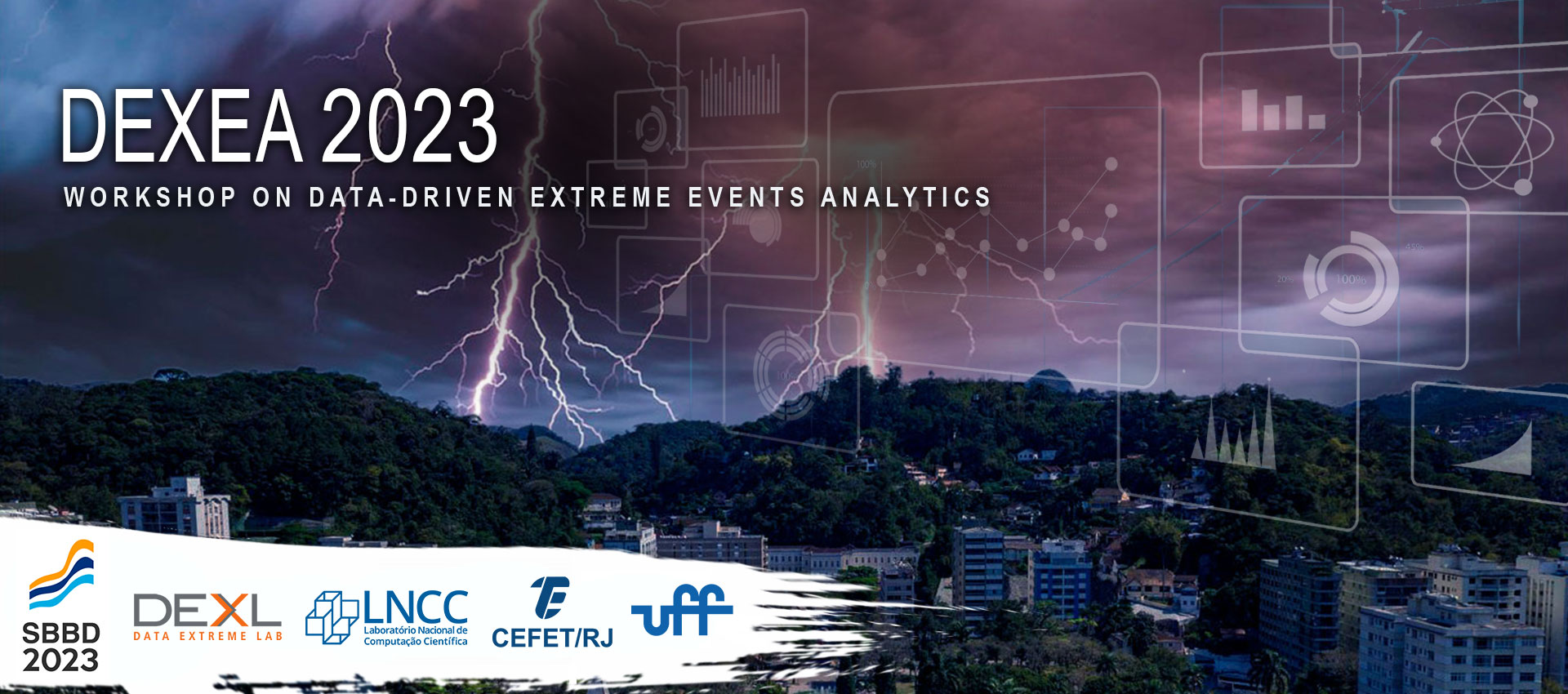2nd Workshop on Data-Driven Extreme Events Analytics (DEXEA 2023) (in conjunction with SBBD 2023)

Extreme Events have recently become a topic of interest for the research community. It encompasses a wide spectrum of phenomena, including, among others, extreme weather events, pandemics, financial outbreaks, solar system explosions, mineral dam collapses, and social network attacks with fake news.
Due to the complexity of these events, non-linear and multi-phenomena, modeling through mathematical equations becomes very hard and, when possible, it requires a huge computing power to run the models in time for an efficient response from the authorities involved in responding to the events. In this context, data-driven models become a very interesting alternative. As data from different sources become available or have been collected for decades (as in the meteorology scenario) it enables learning from data strategies exploiting the current stage of data mining, machine learning, and deep learning models. However, integrating the huge amount of heterogeneous data needed to reproduce these phenomena requires efficient systems to store and process data.
Exploring the huge space of data management solutions currently available is paramount to come up with directions that the community may use to support their prediction applications. Moreover, once a data-driven approach is followed there is a need to formalize the problem. Logical formalisms and ontological approaches may be useful in precisely defining entities and their relationships involved in extreme events. This complex network of related information may be suitable for the construction of a knowledge graph for their representation. All these lines of research that have been developed by the data management community are candidates for supporting the research on extreme event detection. Conversely, we expect that new opportunities will arise with requirements for data management and analysis research. Thus, in this Workshop, we intend to foster the research in Brazil towards data-driven approaches to support event analytics, especially extreme event detection and prediction.
Several research communities study the problem of extreme events:
- Environmental Sciences: Assessing and predicting extreme weather events, such as hurricanes, floods, droughts, and heatwaves, is of paramount importance in this field. Modeling the tails of the distribution of meteorological variables and estimating return periods for extreme events heavily rely on extreme observations.
- Environmental Risk Assessment: The analysis and modeling of extreme events related to natural hazards, including earthquakes, landslides, or tsunamis, demand appropriate methods. These methods assist in estimating the probabilities and magnitudes of extreme events, evaluating potential impacts, and informing risk management strategies.
- Finance and Risk Management: Extreme events are crucial considerations when modeling and analyzing financial phenomena, including stock market crashes, extreme price movements, and financial losses. Estimating extreme quantiles, determining value at risk (VaR), and calculating tail risk measures all rely on the presence of extreme values.
- Healthcare: Extreme events are also relevant in healthcare for undertanding several processes, such as Epidemic Outbreaks, Emergency Planning, Patient Risk Assessment, Public Health Interventions, Resource Allocation.
- Hydrology and Water Resources Management: Analyzing and predicting extreme hydrological events, such as floods, droughts, or extreme river flows, requires methods that handle extreme values. These methods assist in estimating the probability of extreme events, designing water management infrastructure, and assessing water resource availability.
- Insurance and Actuarial Science: Extreme values play a significant role in the analysis and modeling of extreme insurance losses. They aid in estimating high quantiles of loss distributions, determining ruin probabilities, and assessing capital requirements for insurance companies.
- Physics and Astronomy: In this domain, extreme values appear as astronomical transient events, statistical modeling of cosmic structures, fluctuations in the cosmic microwave background, to name a few.
- Quality Control and Reliability Engineering: Extreme value analysis is also applied in quality control and reliability engineering to detect anomalies in manufacturing processes and product failure data. These methods aid in setting appropriate control limits, identifying outliers, and estimating extreme failure rates.
- Social Networks: Extreme events in social networks have a significant impact on the topic trends of social networks, such as Twitter. There are events that appear in the network and migrate to the real world, fake news being an example, and vice-versa, when events of the real work cause a reaction in the social networks.
- Structural Engineering: Extreme events are also relevant in structural engineering, where evaluating the risk associated with extreme loads or forces acting on structures is crucial. Estimating extreme values of loads, designing structures to withstand extreme events, and evaluating the overall safety of engineering systems are key considerations.